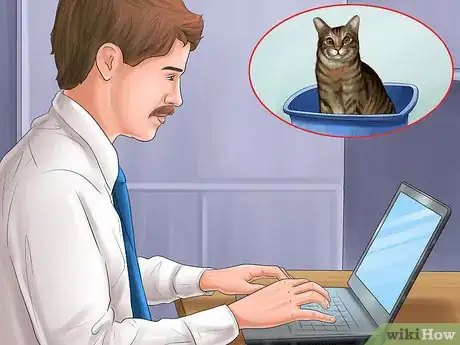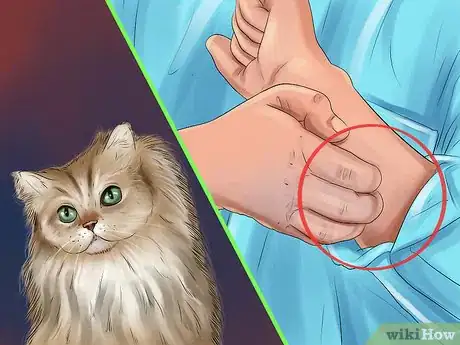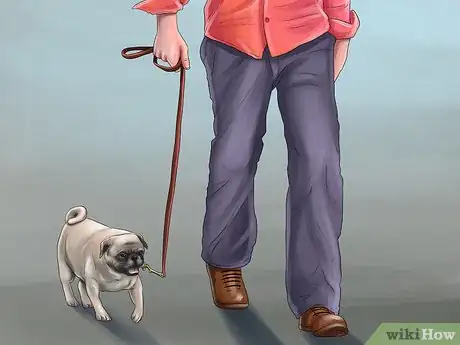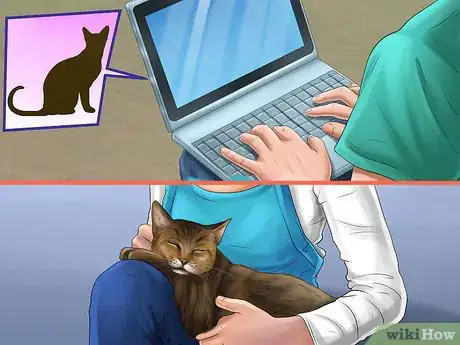This article was co-authored by Russell Hartstein, CDBC, CPDT. Russell Hartstein is a Certified Dog & Cat Trainer and CEO of Fun Paw Care in Los Angeles, California. With over 25 years of training, nutrition, boarding, and daycare experience, Russell and the Fun Paw Care team provide the most current, humane, and science-based methods utilizing force-free positive reinforcement to train and care for pets. Russell is an author for PetMD, Chewy, and Dogster. He is also regularly cited in publications from various organizations, including The New York Times, The Wall Street Journal, and the American Veterinary Medical Association (AVMA). He is a Certified Dog Behavior Consultant with the International Association of Animal Behavior Consultants and a Certified Pet Dog Trainer. He received his bachelor’s degree in History and Economics from Binghamton University.
This article has been viewed 48,913 times.
Have you always had a dream of owning an animal, but the circumstances were never right? Do you think you’ve finally reached a point in your life where you have the time and energy to give to something else? This is the perfect time to consider adding a pet to your life. However, after this first decision, another complicated possibility arises: what pet to get. If you are unsure if a dog or cat is best for you, there are some factors you can take into consideration to help you decide.
Steps
Considering Your Lifestyle
-
1Evaluate how busy you are. If you aren't home very often and are often busy with work, a cat might be a better option for you. Most cats don't depend on you that much for companionship and are fine with alone time. Plus, they use a litter box, which means you don't have to worry about them messing up the house when you aren't at home.
- Dogs require more time. Dogs need 30 to 60 minutes of exercise daily. If not, they will learn bad habits such as excessive barking, destructive tendencies, hyperactivity, scratching, or biting. They also need to be taken out a few times a day.
- This doesn't mean that you should get a cat if you are at home only to sleep. This would be cruel for your cat, who will need some interaction and care from you, such as fresh water daily and nail and fur care. They are just more low maintenance on a daily basis than dogs.[1]
-
2Think about your free time. If you have a lot of free time and want to spend it with an animal, a dog is a better option. In fact, most dogs crave attention and don't like being left alone for too long. If you want a pet that you can go outside and run with, go swimming with, or just one that is more adventurous, get a dog.
- If you prefer a more sedentary lifestyle, think about a small lap dog who is less prone to excessive exercise. This kind of lifestyle is also good for a cat.
- If you travel from home a lot, you will need to arrange for pet care. If you leave your dog at home, she will need a pet watcher to come to your home at least twice a day to let her out and feed her. However, a cat can go for a day or two without being checked on as long as he has enough food and water available to him.[2]
Advertisement -
3Look at your finances. Dogs and cats are not cheap. Both pets need basic things, such as food, water, and consistent veterinary care. Cats need litter, a litter box, scratching posts, and toys to remain happy, healthy pets. Dogs need more food, toys, and carriers for traveling. It is generally easier to take a cat with you or find a cat sitter, but often dogs have to be kenneled, which is an extra expense.[3]
- Some cats, especially those with long or thick fur, will need regular grooming or a daily brushing. You may pay to have this done, or you may have to take time to do it yourself.[4]
- The average cat costs $1035 the first year to own. For dogs, a small dog averages $1314 in the first year and a large dog averages $1843. This includes daily care as well as vaccinations and neuter or spaying. This doesn't take into account any emergency care.[5]
Looking at Your Living Arrangements
-
1Consider the size of your home. Where you live can also impact which animal you have. Cats do fine in most environments, whether you live in a small house or a mansion with a huge yard. Dogs, depending on how large they are, require more space. It also helps to have a yard if you have a dog, which means you can just let her out to play and do her business in the back yard sometimes.
- If you live in an apartment, think about a small dog or a cat. In these cases, many landlords will demand an extra deposit to cover any potential damage done to their property by your pet.
-
2Think about those who live with you. When deciding if you want a pet, you have to think about the people who live with you. If the people are your family or your significant other, the decision to have a pet will likely be one you make together. You have to figure out everyone's preferences and what they feel about the different kinds of cats and dogs.
- If you live with a roommate, you will need to take into consideration their needs and desires about getting a pet. Can they handle a rambunctious puppy, a roaming cat, or a large dog in your home? You have to consider their quality of life when deciding to get a pet.
- You also need to establish whether the people in your house are willing to help take care of the animal while you are away at work, school, or traveling.
-
3Look for allergies. Before you get a pet, you have to check to see if your family members or roommates have cat or dog allergies. You don't want a roommate or family member to be miserable or to get attached to a pet you can't keep. To check before getting a pet, visit friends or family that have cats and dogs separately, so you can decide which one a person might be allergic to.
- If you don't have friends with pets, visit the humane society to play with their animals.
- Nothing is more heartbreaking than having to give up a loved pet because someone in the family has allergies, so always be sure before adopting or buying a pet.
Picking the Kind of Pet
-
1Research different breeds. Before you can get a pet, you need to find the right breed of animal for you. Think about the kinds of breeds you think you'd like and then research them. You can do this online, through your vet, or by talking to knowledgeable people.
- This applies to both species. Some cats need more attention than others. Some dogs are more vocal than others. Some breeds tend to have worse tempers than others. All these details are important if you want to find a pet that will suit you.
- If you aren't sure, try the American Kennel Club's online dog breed selector program or the American Humane Society's online checklist on cat breed selection.[6] [7]
-
2Check the temperament. The kind of animal you want may depend on their temperament or physical capabilities. You might want a rambunctious puppy that will turn into a big dog in need of a lot of exercise, especially if you are a very active person. If you are more a walk in the park kind of person, consider a small dog breed that enjoys slower activity.
- Cat's can be very temperamental. If you want a pet to hold, pet, and snuggle with all the time whenever you want, you may need to get a small dog. If you want an animal that will snuggle with you and love on you when he wants but not all the time, a cat might work better for you.
-
3Get a pet. Once you have examined all the factors and know you can handle a pet, live in the right place for a pet, and know which kind you want, you need to choose a pet. Spend time searching for the perfect pet for you. Search the internet or classified sections to find pets for sell. This is a good method if you want a particular purebred animal. Also visit your local humane or rescue society to consider adopting a fine, healthy pet.
- If you find one you like, contact the owner or shelter people to let them know you’re interested in the animal. Then, return to the place every day for a few days to spend time with the animal. This will help you both adapt before you take her home.
- Some shelters and owners will let you take the animal as a foster pet for a while until you become familiar with what she is like and decide you want to keep her.
Expert Q&A
-
QuestionWhat should you know before getting a cat?
 Pippa Elliott, MRCVSDr. Elliott, BVMS, MRCVS is a veterinarian with over 30 years of experience in veterinary surgery and companion animal practice. She graduated from the University of Glasgow in 1987 with a degree in veterinary medicine and surgery. She has worked at the same animal clinic in her hometown for over 20 years.
Pippa Elliott, MRCVSDr. Elliott, BVMS, MRCVS is a veterinarian with over 30 years of experience in veterinary surgery and companion animal practice. She graduated from the University of Glasgow in 1987 with a degree in veterinary medicine and surgery. She has worked at the same animal clinic in her hometown for over 20 years.
Veterinarian Cats have a much more independent nature which some 'dog people' find unrewarding. If you are considering a cat over a dog because of time constraints, be aware that cats are not small dogs but have a character all of their own.
Cats have a much more independent nature which some 'dog people' find unrewarding. If you are considering a cat over a dog because of time constraints, be aware that cats are not small dogs but have a character all of their own.
References
- ↑ https://www.aspca.org/pet-care/virtual-pet-behaviorist/dog-behavior/exercise-dogs
- ↑ https://www.vetinfo.com/cats-dogs-pets.html
- ↑ https://www.vetinfo.com/cats-dogs-pets.html
- ↑ http://www.vcahospitals.com/main/pet-health-information/article/animal-health/grooming-and-coat-care-for-your-cat/4292
- ↑ https://www.aspca.org/adopt/pet-care-costs
- ↑ www.akc.org/find-a-match/#slide1
- ↑ www.humanesociety.org/animals/cats/tips/choosing_cat.html
About This Article
If you're trying to choose between a cat and a dog as a pet, consider your lifestyle. A cat may be best if you're busy or away from home often, since they require less companionship and attention. If you have lots of free time and crave constant companionship, a dog is a great option. Cats and small dogs are typically less expensive and do well in most environments. Large dogs need more space and its best if you have a yard or outdoor area for them. For tips from our Veterinary co-author on how to evaluate breed and temperament, read on!



































































